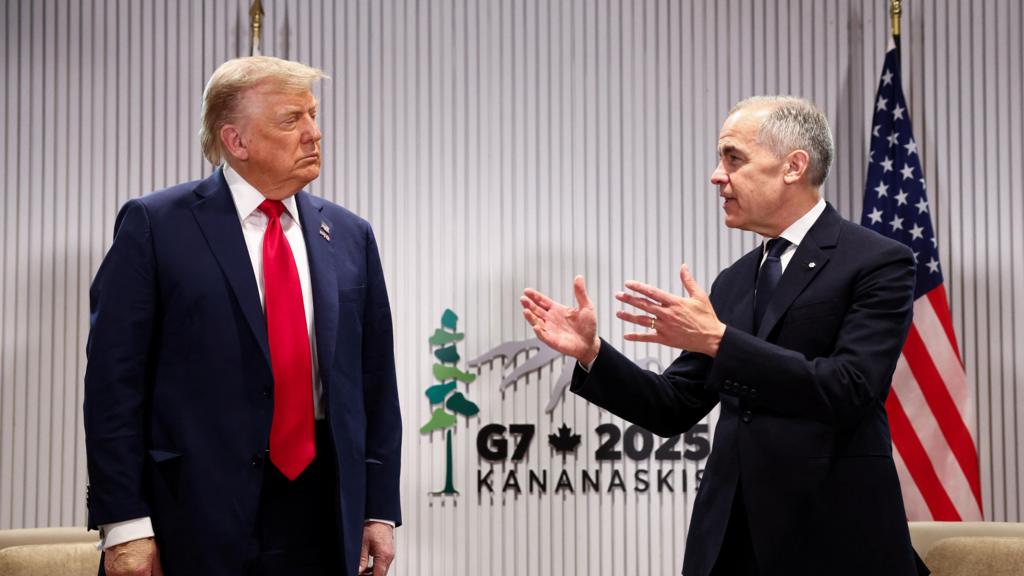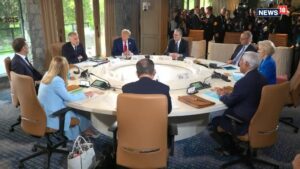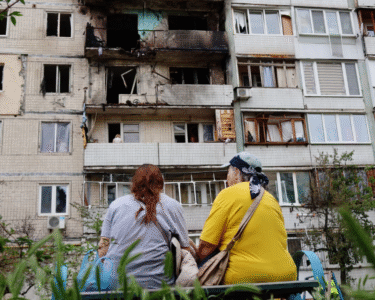G7 leaders gathered today in Kananaskis, Alberta, for an extraordinary summit that has exposed profound rifts within the Western alliance, as escalating crises in the Middle East and Ukraine dominate global attention. The meeting, convened against the backdrop of intensifying conflict between Israel and Iran and the ongoing war in Ukraine, has been marked by sharp disagreements between President Trump and his European counterparts on fundamental security issues.
The summit’s most striking moment came when President Trump refused to sign a joint declaration affirming Israel’s right to self-defense and opposing Iran’s nuclear ambitions. The proposed statement, which G7 leaders had drafted to present a unified Western position on the Middle Eastern crisis, encountered unexpected resistance from the American president. Trump’s refusal to endorse the declaration carries significant diplomatic weight, particularly given the United States’ role as Israel’s primary ally in the region, and raises questions about America’s commitment to containing Iranian influence.
The Iranian issue has taken center stage at the summit as oil prices surge following the Israel-Iran conflict, providing substantial revenues to Russia’s war effort in Ukraine. European leaders are pressing for enhanced sanctions against Moscow, including further reductions to the Russian oil price cap, to prevent the Kremlin from capitalizing on elevated global energy prices. However, these efforts face resistance from Trump, who has expressed markedly different views on how to handle Russian aggression.
Trump’s position on Russia became particularly apparent when he criticized the G8’s decision to expel Russia following the 2014 annexation of Crimea. “That was a big mistake. You wouldn’t have had this war. Putin talks to me, he doesn’t talk to anyone else because he got insulted when he was thrown out of the G8”, Trump stated during discussions. His remarks, interpreted as a defense of Russian President Vladimir Putin, underscore the growing divide between American and European approaches to Moscow’s actions.
The diplomatic tensions have been further complicated by French President Emmanuel Macron’s recent high-profile visit to Greenland, where he met with the Danish and Greenlandic prime ministers. The visit is widely viewed as a calculated diplomatic maneuver designed to demonstrate European support for Greenland’s sovereignty and territorial integrity. More significantly, it represents a direct response to Trump’s previous statements about potentially acquiring Greenland, including his refusal to rule out military action to achieve this objective, despite the island being under Danish sovereignty.
Ukrainian President Volodymyr Zelensky is scheduled to arrive in Canada tomorrow as a guest of honor, where he will meet with Trump and other G7 leaders. His participation is expected to intensify discussions about the appropriate Western response to Russian aggression, particularly given the divergent positions among allies regarding military and economic support for Ukraine.
The summit’s challenges extend beyond security matters to economic policy, as Trump’s tariff policies continue to strain relationships with European partners. The tariffs impose additional economic pressure on allies already grappling with the costs of supporting Ukraine and managing energy security concerns. This combination of economic and security disagreements creates a complex web of tensions that summit organizers are struggling to navigate.
European leaders are advocating for a more confrontational stance toward Russia, arguing that Moscow’s refusal to agree to a ceasefire in Ukraine necessitates stronger punitive measures. They contend that additional sanctions, particularly those targeting Russia’s energy revenues, are essential to weakening Putin’s capacity to sustain his military campaign. However, Trump’s apparent openness to dialogue with Putin and his criticism of previous Western actions against Russia suggest a fundamentally different approach to managing the crisis.
The divisions at Kananaskis reflect broader questions about the future of transatlantic cooperation during a period of unprecedented global instability. With multiple crises demanding coordinated international responses, the inability of Western allies to reach consensus on fundamental issues raises concerns about their collective capacity to address emerging security challenges effectively.
The summit’s outcome will likely have far-reaching implications for international efforts to contain Iranian nuclear ambitions, support Ukrainian resistance, and maintain the cohesion of the Western alliance. As leaders continue their deliberations, the stark differences in approach between the United States and its European partners have become impossible to ignore, potentially signaling a new phase in transatlantic relations characterized by increased strategic competition rather than cooperation.
The Kananaskis gathering has thus far demonstrated that even among the world’s most developed democracies, achieving unity in the face of authoritarian challenges remains an elusive goal, with implications that extend far beyond the summit’s conclusion.
Photo: AP




